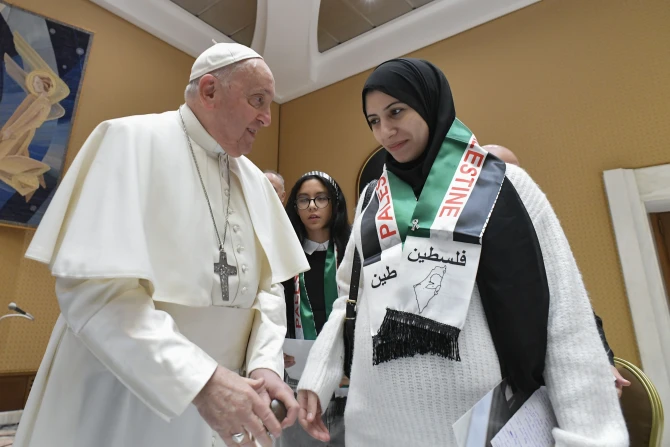A Pope for Palestine?

Image Courtesy of Catholic News Agency
By Thomas Sukiennik
Amid over a century of tension between Israel and Palestine, Catholics and others around the world may look to leaders like Pope Francis for clarification on what is happening there today. Despite it being a highly contentious topic , Pope Francis has advocated in support of the Palestinian people since early on in his Papacy.
Elected Pope on March 13, 2013, Pope Francis visited Jerusalem early in his papacy on the 50th anniversary of Pope St. John Paul II’s visit . During his visit in May of 2014, the official Vatican program referred to Mahmoud Abbas as the president of the state of Palestine. In 2015, the Vatican signed an agreement officially recognizing Palestine, resulting in heavy criticism from Israel’s foreign minister.
Recently, in December of 2024, Pope Francis included a keffiyeh, the traditional Palestinian scarf, in his Vatican nativity underneath the statue of baby Jesus. This nativity was made by Palestinian artisans in Bethlehem. The crowd at the unveiling included representatives of the Palestinian Embassy to the Holy See and special representatives of Abbas.
Pope Francis has not only taken actions and presence to support Palestine, but has also spoken in support of their humanity. According to Vatican News, in September of 2024, Pope Francis said that Israel’s attacks in Gaza and Lebanon have been “immoral and disproportionate” and “Israel’s military has gone beyond the rules of war.” In his November 2024 book, Hope Never Disappoints: Pilgrims Towards a Better World, Pope Francis stated that, “What is happening in Gaza has the characteristics of a genocide. We should investigate carefully to assess whether this fits into the technical definition [of genocide] formulated by international jurists and organizations.” This is the first time a pope has openly urged for an investigation into a genocide by Israel in Gaza.
On March 3rd, 2024, Pope Francis offered a speech in St. Peter’s Square, in which he said, “I carry the pain and suffering of Palestinians and Israelis in my heart.” He asked, “Do we really think we are building a better world in this way? […] Enough, please. Let us all say: Enough, please!” He repeated: “Stop the war” and encouraged continuing negotiations for a ceasefire in Gaza.
Although Pope Francis has repeatedly used his platform to advocate for the Palestinian people, critics have argued that he is too harsh towards Israel. According to Reuters, the Jewish spiritual leader of Rome, Rabbi Riccardo Di Segni, spoke against the Pope, saying he “has unfairly focused his attention on Israel compared to other ongoing world conflicts, including those in Sudan, Yemen, Syria and Ethiopia”. This condemnation towards the Pope makes sense given the murky history between Israel and the Vatican.
Historically, the church has, more often than not, been against the establishment of the state of Israel, only formally recognizing it in 1993. In 1904, the founder of the Zionist movement, Theodore Herzl, had an audience with then-pope Pius X. He asked him for public support for the establishment of the State of Israel, which Pope Pius X refused. Later on, in 1917, Zionist Nahum Sokolowmet with Pope Benedict XV to see if he would support the creation of a state for Jewish people in Palestine. Pope Benedict XV refused to support this idea too. After the signing of the Balfour Declaration, the Vatican continued to oppose Israel’s creation. However, despite some of the opposition from the Vatican, the modern State of Israel was established in 1948.
Given this complex history, Pope Francis is in a difficult position. He has to face both Palestine and Israel’s calls for advocacy. Pope Francis has to balance on the line of peace, upholding human dignity, and condemning the evils across the Middle East.







